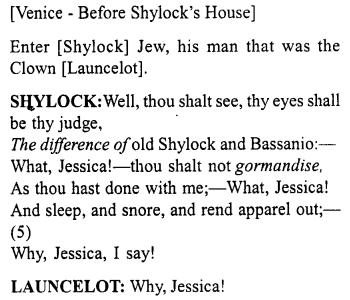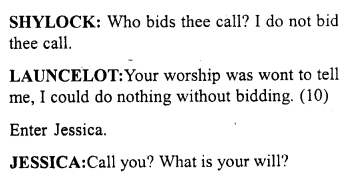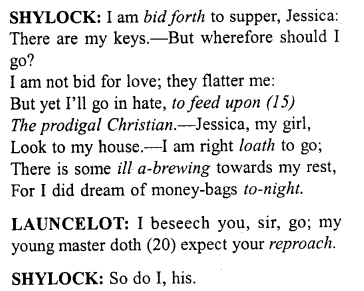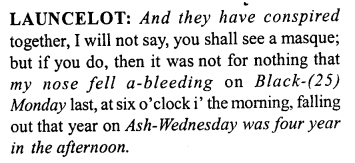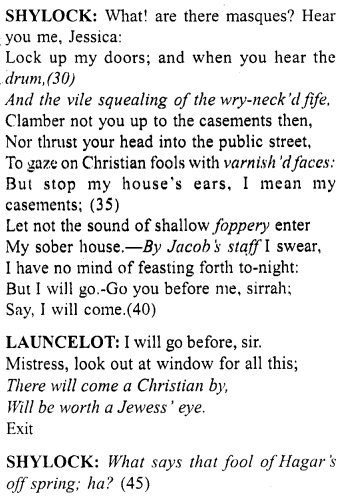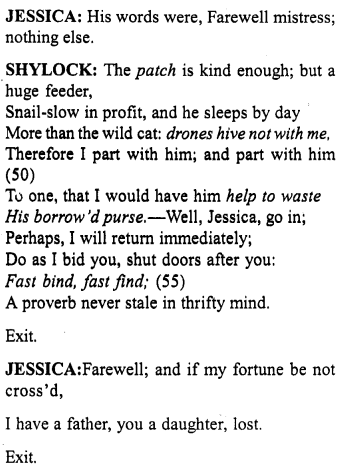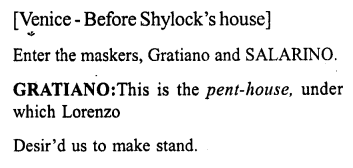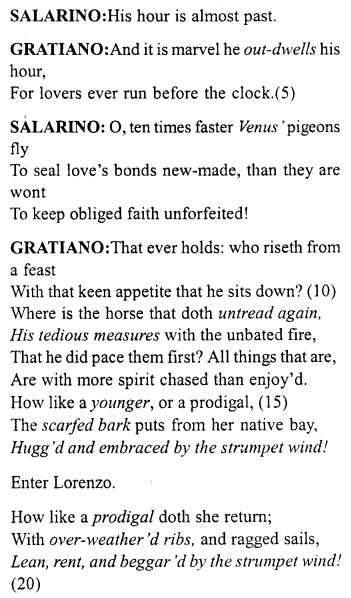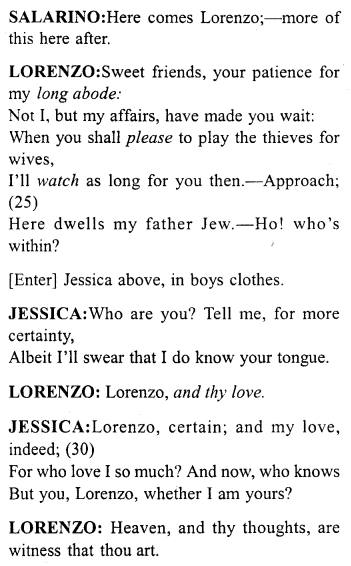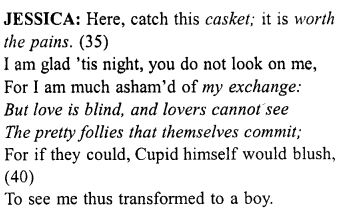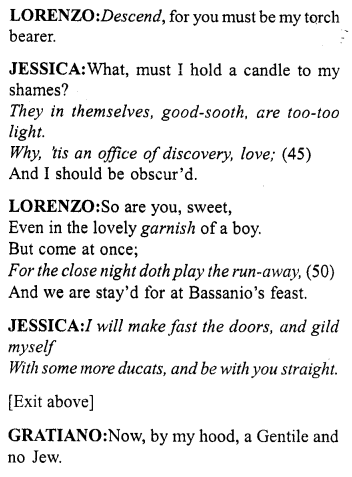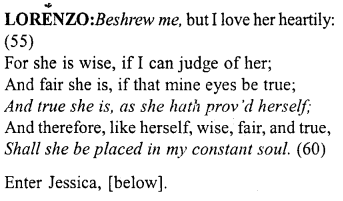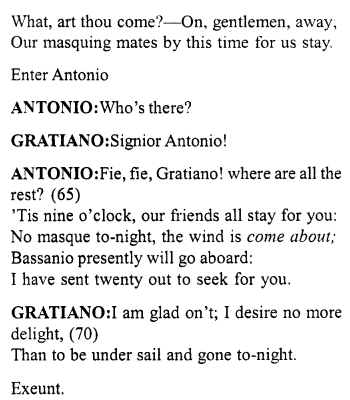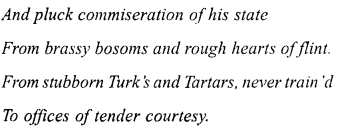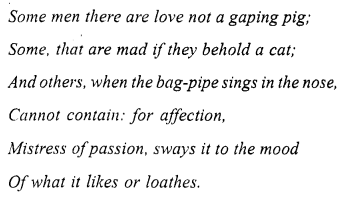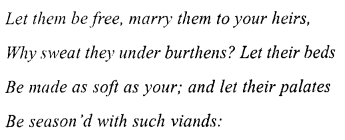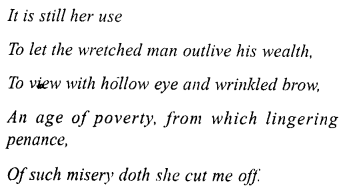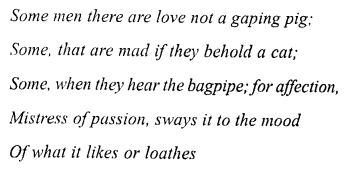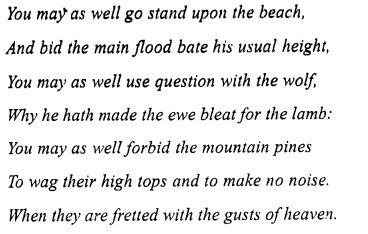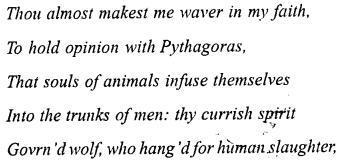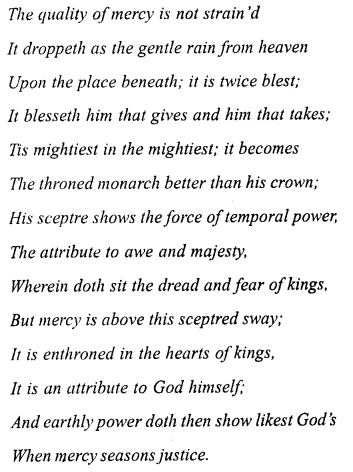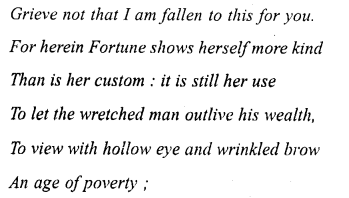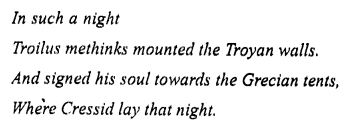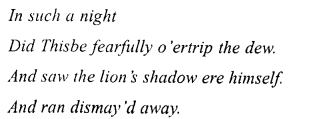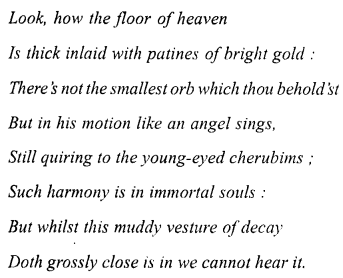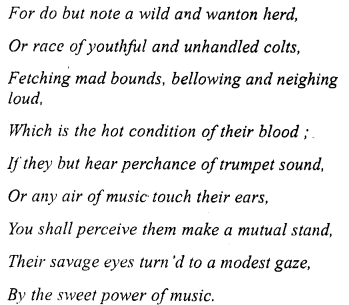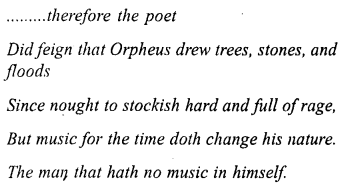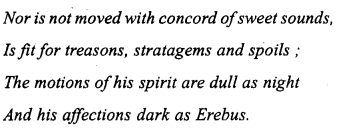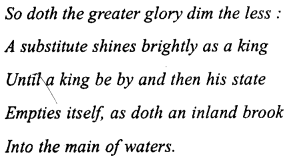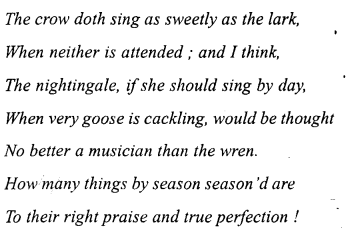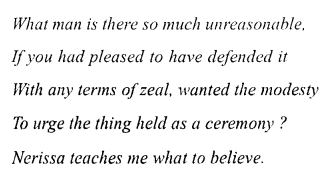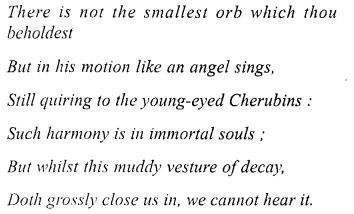Merchant of Venice Workbook Answers Act 3 – Passages with Reference to the Context – ICSE Class 10 & 9 English
ICSE SolutionsSelina ICSE SolutionsML Aggarwal Solutions
EnglishMathsPhysicsChemistryBiology
Passage – 1
(Act III, Sc.I, Lines 31-35)
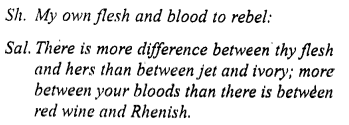
Context : This is a piece of dialogue between Shylock and Salarino in The Merchant of Venice when Jessica has run away from her father’s home.
Explanation : Shylock condemns his daughter for having run away from home and having thus defied her own father. Salarino says that there is nothing in common between Shylock and Jessica. She differs from her father as much as the black colour differs from the white or as red wine differs from white wine. In other words, there is a world of difference between Shylock and Jessica, and therefore, if she has run away from home, she has done Shylock no wrong.
Passage – 2
(Act III, Sc.I, Lines 45-50)
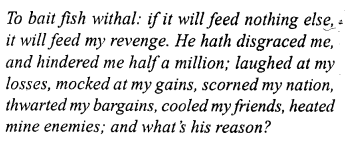
Context : These words are spoken by Shylock to Salarino and Salanio in The Merchant of Venice. The two friends have been talking to the Jew about the reported losses of Antonio. Shylock utters a warning with regard to the bond signed by Antonio. On being asked what he will do with a pound of human flesh, Shylock makes this replay.
Explanation : Shylock says that he will insist , on having a pound of Antonio’s flesh. He will use this flesh as a bait to catch fish! If Antonio’s flesh serves no other purpose, it will at least satisfy Shylock’s revenge. Shylock then enumerates the injustices and indignities which Antonio has heaped upon him. Antonio, he says, has been causing him financial losses. Antonio has been rejoicing at his losses and jeering at his gains, Antonio has been abusing the Jewish race. Antonio has spoilt his bargains. Antonio has deprived him of his friends and instigated his enemies against him. And what is Antonio’s reason for doing all these things? The only reason is that Shylock is a Jew.
Passage – 3
(Act III, Sc.I, Lines 59-63)
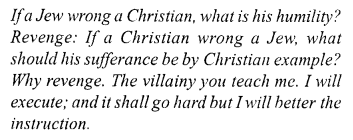
Context : These lines, taken from The Merchant of Venice, are part of Shylock’s speech containing a passionate plea of his revenge on Antonio.
Explanation : Shylock says that, if a Jew were to do any wrong to a Christian, the Christian would surely take his revenge. If, then a Christian does wrong to a Jew, should not the Jew also take revenge? Shylock adds that his desire to take revenge is born of the Christians’ own revengeful nature. He is simply following their example in wanting his revenge. His revenge, he says will certainly be more cruel than Christian revenge (because he has been the victim of too many wrongs and injustices).
Passage – 4
(Act III, Sc.I, Lines 80-85)

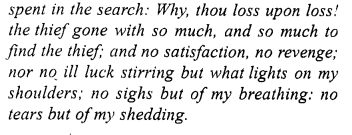
Context : These words are spoken by Shylock to Tubal in The Merchant of Venice. Shylock is expressing his grief over the loss of his daughter and of his money-bags—and also over the loss of the money spent on tracing the run-aways.
Explanation : Shylock says that he has suffered an additional loss by spending a lot of money in his effort to trace Jessica and her Christian lover. He wails that he has not even been able to satisfy his revenge by finding and punishing them. He sorrowfully says that he alone in the world has suffered so many griefs. He is the only one to sigh and to shed tears.
Passage – 5
(Act III, Sc.II, Lines 47-53)
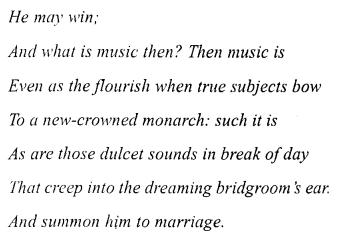
Context : These lines are part of Portia’s speech in The Merchant of Venice when Bassanio surveys the caskets in order to make his choice
Explanation : Portia says that, if Bassanio is successful, the music which she has ordered will appear like the sounding of trumpets at the time of the coronation of a new king when faithful subjects bow before him. Or, this music will be as sweet as the sounds which steal into the heart of a dreaming bride-groom at the dawn of his wedding-day and which invite him to get married.
Passage – 6
(Act III, Sc.II, Lines 53-62)
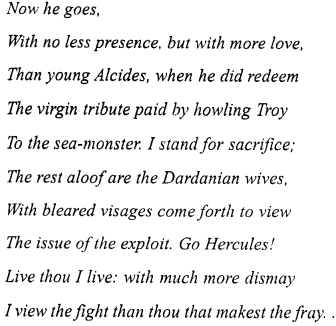
Context : These lines are taken from The Merchant of Venice. They are part of Portia’s speech made just before Bassanio’s choice of casket.
Explanation : In Greek mythology, the King of Troy offended the god of the sea who sent a monster to punish the Trojans. In obedience to the order of an oracle, the Trojans were forced to sacrifice a virgin to that monster every now and then. On one occasion it was decided that the King’s own daughter should be the victim. Hercules, however, fought the monster, killed it and saved the life of the King’s daughter.
Portia here compares herself to the maiden who was to be sacrificed to the monster. Bassanio is compared to Hercules. The choice of a casket is like the battle with the monster. The members of her household are like the weeping Trojan women who had come to watch the result of Hercules’s fight with the monster. On the result of that fight depended the life of the King’s daughter. Similarly on the result of Bassanio’s choice depends Portia’s life and happiness. Portia asks Bassanio to go ahead and make his choice. She says that she is more anxious about the outcome than Bassanio who is about to under trial.
Passage – 7
(Act III, Sc.II, Lines 73-83)
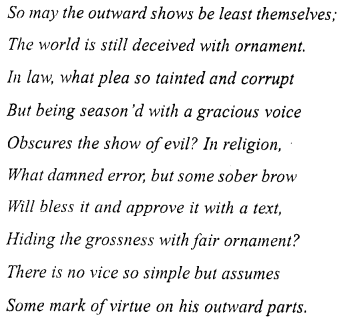
Context : These lines are taken from The Merchant of Venice and from part of one of these speeches of Bassanio in the casket scene.
Explanation : The outward appearance of an object, says Bassanio, is no test of its quality. People usually judge things by their external decoration. In law, even a false case can be given the air and appearance of truth by an able and clever advocate. In matters of religion even an impious theory is given a sacred character by a priest who will support it with quotations from Scriptures. In both these cases, it is clear, evil can be dressed in attractive colours. No matter how wrong a thing may be, it can be made to wear to appearance of righteousness in order to deceive people.
Passage – 8
(Act III, Sc.II, Lines 73-83)

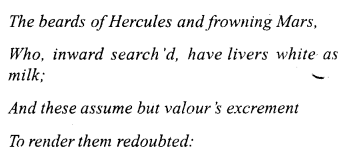
Context : These lines, taken from The Merchant of Venice, are part of Bassanio’s comment upon the gold casket.
Explanation : These are many people in this world who are chicken-hearted. They are devoid of strength like steps of sand, but they put on airs of bravery and heroism. They pretend to possess the courage of Hercules and the fighting power of Mars, but when it comes to a test, their cowardice is exposed. Such people put on a show of heroism just to make themselves fearful to others.
Passage – 9
(Act III, Sc.II, Lines 88-101)
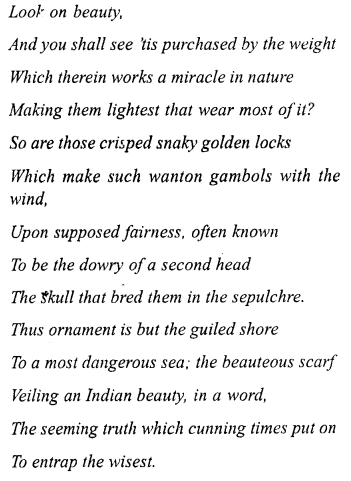
Context : These lines are part of Bassanio’s speech in the casket scene of The Merchant of Venice. As he looks at the casket of gold, he . says that appearances are deceptive.
Explanation : Beauty can be bought with money. Bassanio means that money can purchase beautifying ornaments as well as toilet goods. A woman, who uses these aids to beauty, is really transformed by them and looks very attractive. But those who use these decorations are not actually beautiful. Take the example of a woman who wears hair which she has purchased with money. This hair may be curly, glossy, lustrous—in a word, magnificent. Its tresses, comparable to snakes, may play beautifully with the wind. In reality, however, this hair does not belong to her but to some other woman who has long been dead. A man would no doubt be fascinated by the beautiful hair which the woman is wearing but in being attracted by her he is under a wrong impression. In this way, external decoration proves deceptive. External decoration may be compared to a treacherous shore which leads a ship into a perilous ocean. Or it may be compared to a splendid veil which hides the black face of an Indian woman. In short, external ornament is something undependable and it is used by deceitful persons to mislead even the most experienced people.
Passage – 10
(Act III, Sc.II, Lines 101-106)
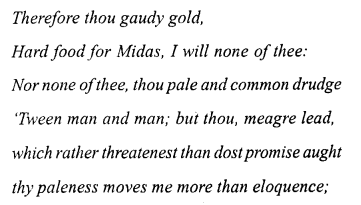
Context : These are the concluding lines of Bassanio’s speech in The Merchant of Venice, made when Bassanio is going to choose one of the three caskets.
Explanation : Bassanio rejects the gold casket on the ground that it is too showy and that gold was the favourite metal for King Midas. Nor is Bassanio attracted by silver which is the common medium of exchange in the everyday transactions of men. He decides to choose the poor casket of lead, the external appearance of which is discouraging rather than hopeful. The paleness of lead appeals to him more than the showy appearance of anything else.
Passage – 11
(Act III, Sc.V, Lines 41-45)
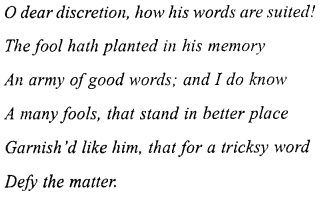
Context : These words are spoken by Lorenzo to Jessica and are his description of Launcelot Gobbo. Launcelot has been, as is his habit, talking in half sensible, half non sensical manner and has been playing upon words, twisting their meaning, distorting the sense, and so on.
Explanation : Lorenzo observes that Launcelot’s words really suit the occasion. Launcelot, says Lorenzo, has stored in his mind a large number of useful words and phrases for all occasions and uses them whenever needed. There are many such fellows, says Lorenzo, who occupy better positions in life but who, equipped with a similar store of words and phrases, use them, in an inappropriate manner. In order to use a clever or effective word or phrase, these fellows often sacrifice the sense. In other words, there are many people who employ fine words and phrases in order to show their ability even if those words and phrases are not suited to convey their ideas.
Passage – 12
(Act III, Sc.I, Lines 50-59)
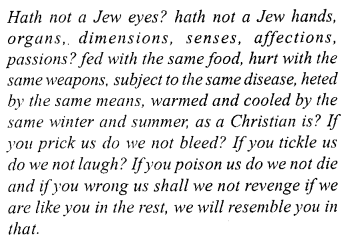
Context : These lines are spoken by Shylock in Act III, Scene I of The Merchant of Venice. This great, passionate speech of Shylock is a fervent protest against religious discrimination and a plea for treating the persecuted Jews as human beings Shylock here stands as the champion of his oppressed race. Antonio has insulted the Jew, publicly, laughed at him and excited his enemies against the Jew. Now his opportunity for revenge has come and he must utilise it.
Explanation : Shylock pleads that the distinction between a Jew and a Christian is an artificial and stupid one. All men belong to the same human family, and there is not elemental difference between men. Is a Jew not fed with the same food as others eat? Is a Jew not hurt when attacked with a weapon, when others are? Shylock sees no reason why the Jews should he hated. A Jew also is attacked by the same disease, healed by the same remedies, wanned by the same summer and cooled by the same winter as a Christian is. They also have a sensation of pleasure and pain. If you hurt them, do they not bleed. The law of cause and effect is absolutely the same with both the Jews and the Christians. Do they not laugh when tickled! They are also liable to be killed by poison as a Christian is. If any wrong is done to them shall they not revenge? When a Christian .suffers an injury, he wants revenge. In the similar manner when a Jew suffers an insult, he too wants revenge. They also have the spirit of retaliation and skill certainly take revenge when they have an opportunity.
Passage – 13
(Act III, Sc.I, Lines 77-79)

Context : These lines are an outburst of Shylock’s feeling of despair at the loss of his daughter. These lines he utters in Act III, Scene I of The Merchant of Venice when Tubal informs him that his daughter Jessica is squandering Shylock’s wealth with Lorenzo, a Christian lover.
Explanation : Shylock prefers the death of his daughter to the disgrace and humiliation that she brought to him and his race by eloping with a Christian. Surely he did not wish that his daughter had been dead, so that he might snatch away her jewels from her ears, he wished that his daughter had died instead of having run ]\ away with a Christian. “If the dead body of his daughter in the coffin were only within his reach, he would have tom the jewels from her ear, and taken the ducats out of her coffin.”
Passage – 14
(Act III, Sc.II, Lines 14-19)
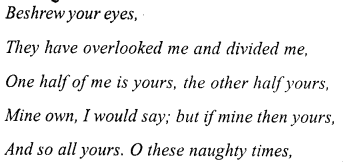

Context : These lines taken from Act III, Scene II of The Merchant of Venice are spoken by Portia. In this sense, she prays to Bassanio to choose the right casket. She even asks him to delay making the choice so not to commit any mistake and even hints him regarding which casket to choose.
Explanation : In the scene where Bassanio makes the choice of the caskets, Portia makes a confession of love even before Bassanio ventures to try his luck. In an artlessly artful manner she says that half of her belongs to him already, while the other half which she would call her own, is also his like everything else in his possession. Thus, she is entirely Bassanio’s; nevertheless he may not take possession of that which rightly belongs to him. These naughty times put bars between the owners and their rights. Bassanio cannot marry Portia unless he succeeds in choosing the right casket. It is noteworthy that here Portia under the influence of her love for Bassanio, almost bewails the tyranny of her father’s will in the matter of the marriage. Out of respect to his memory she calls it the tyranny of the times a vague expression for what she really wants to say.
Passage – 15
(Act III, Sc.II, Lines 97-101)
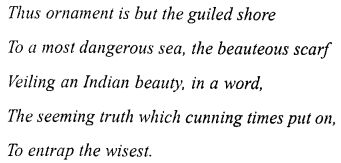
Context : These lines are taken from Act III, Scene II and are spoken by Bassanio in The Merchant of Venice. In these lines he points out how people entrap other people by putting on false appearances. This outward decoration might even entrap the wisest.
Explanation : In these lines, spoken by Bassanio in Act III Scene II when he has listened to the song played by Portia’s musicians and decided to choose the lead casket, he mentions how the foolish people look at the polished surface of things, rather than the core, and repent later. The mariner who is guided by the playful glitter of the sun’s rays upon the ways of the sea crushes against the sunken reef. A dark face can hide itself in a beautiful scarf, the seemingly true turn out to be false. Although Bassanio is wiser after his own experiences of life, it is the theme of the song that directs his thoughts in the right direction, “Tell me where is Fancy bred?”
Passage – 16
(Act III, Sc.II, Lines 178-183)
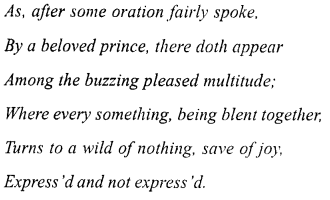
Context : Over whelmed by Portia’s speech Bassanio speaks these lines in Act III, Scene II.
Explanation : This passage is full of poetic beauty. Bassanio is so much overpowered with the speech of Portia that he cannot speak at all. The rapid running of blood through his veins is the only indication of the feeling within him. And if only she could, in her imagination, reach out to that blood, she would know those feelings. There is no other means of expression left to him at the moment. He says that he has been thrown into a confused state and the bewilderment of his mental faculties may be compared to such confusion as may be noticed in a multitude after some popular monarch has delivered a fair speech. After this royal oration, the pleasing voices of the multitude, individually expressive of joy, would unite into a wild nothing. The different expressions of their approbation of the royal oration have some meaning in themselves, but when they are mixed up in a wild medley of sounds they become expressive of no meaning except that they are a cumulative expression of joy which cannot be heard in distinct, clear articulate words. Exactly the same is the case with Bassanio, who cannot express his ecstasy.
Passage – 17
(Act III, Sc.II, Lines 287-291)
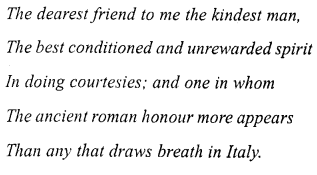
Context : This is Bassanio’s tribute to the character of Antonio, his kinsman and patron. Just after the successful termination of the Casket choosing scene. Bassanio receives a letter in which he is informed of Antonio’s misfortune. Portia asks him about Antonio and the nature of his danger.
Explanation : Antonio, Bassanio says, is a man of the sweetest and noblest nature and one who is never tired of doing acts of kindness towards others. Though Antonio is a modern Italian, in his code of conduct, in his standards of morals, he is an ancient Roman, the like of whom is nowhere to be found in the whole of Italy. (Romans in ancient days held high honours for their morals and patriotism).
Passage – 18
(Act III, Sc.V, Lines 42-46)


Context : These lines are spoken by Lorenzo in The Merchant of Venice in Act III, Scene V7 where he very beautifully analyses Launcelot feeling. Launcelot is to use a Shakespearean expression a fool positive. He has an armoury of words at his command from which he draws ‘ at will and uses the words at the sacrifice of the meaning.
Explanation : Lorenzo asks Launcelot to go and arrange the dinner. Launcelot in usual clownish way twists the meaning of Lorenzo’s words. This annoys Lorenzo. He says that Launcelot has gathered many expressions and good words without properly understanding their senses and uses them always in wrong context. He sacrifices the sense for sound. But Launcelot alone is not to be blamed. Many people occupying higher positions in life than Launcelot do the same thing. These people have a store of fantastic expressions and use them, no matter whether they suit the topic to which they apply them or not.
Passage – 19
(Act III, Sc.V, Lines 55-59)
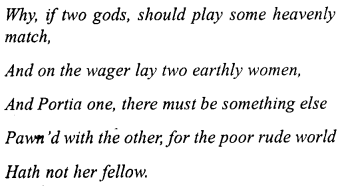
Context : These lines are spoken by Jessica in praise of Portia in Act III Scene V, of The Merchant of Venice. Both she and Lorenzo have arrived in Belmont and have been left incharge of the house by Portia while leaving stealthily for the Duke’s court. In her absence they talk of her beauty and worth among themselves.
Explanation : Jessica says that Portia is the most beautiful lady ever born in this world. Her equal cannot be found anywhere. If two gods play a match by staking two earthly women and one of them is Portia, then to the other something else must be added because such a lady does not exist at all. She is unequalled and unapproachable.
Passage – 20
(Act III, Sc.II, Lines 108-119)
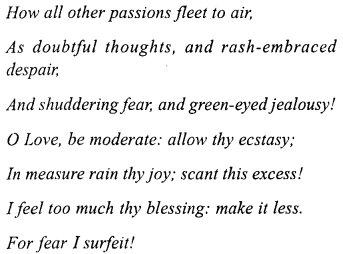
Context : These words are spoken by Portia in The Merchant of Venice when Bassanio has successfully made his choice of a casket.
Explanation : All Portia’s fears and doubts now melt away. There is no more of that despair in her heart to which she had so rashly given way. Jealousy, which gives to human eyes a pale and wasted look, has been driven out of her heart. Her joy is at this time excessive. She cannot bear such an intensity of joy. She, therefore, wants this excessive joy to diminish so that she can bear it. Too much of joy might create a feeling of over-satisfaction. Therefore, she wants it to become less. She appeals to love to reduce the intensity of the pleasure it has given rise to.
Passage – 21
(Act III, Sc.IV, Lines 62-71)
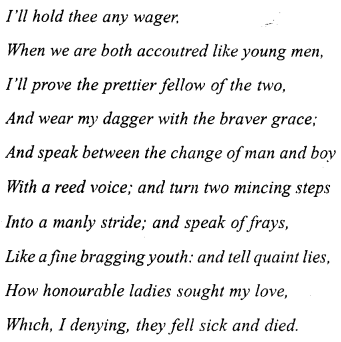
Context : These words are spoken by Portia to Nerissa in The Merchant of Venice, when she has decided to go to Venice in male disguise along with Nerissa who will also be disguised as a man.
Explanation : Portia tells Nerissa how she will behave when she is in masculine clothes. She says that when they are both in male disguise, she can bet that she will look more handsome than Nerissa. She says that she will wear her dagger more smartly and will speak in the shrill voice of a person who has just entered from boyhood into manhood. While walking, she will take long steps, not short ones which a woman takes. She will talk of fighting as boastful young men do. She will invent clever lies and talk of women of high status who fell in love with her and who died of love sickness and disappointment, because she did not respond to their love. Portia is satirizing the ways of young men who boast of their bravery in fighting and who boast even more of their exploits in love.
Passage – 22
(Act III, Sc.IV, Lines 72-78)
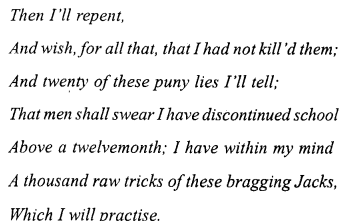
Context : These words are spoken by Portia to Nerissa in The Merchant of Venice when Portia has decided to dress herself in male clothes in order to go to Venice. She will take Nerissa along with her, and Nerissa will also be dressed in male clothes. Portia mocks at the behaviour of young men who boast of their adventures in love and of their bravery.
Explanation : Portia says that, when she is dressed like a man, she too will boast of her conquests over the hearts of women. She will relate stories about women who died for her sake. Then she will express her regret at having let them die. She will tell scores of such petty lies. She says that she will so successfully imitate the talk of men that people will really begin to think her a young man who has recently left school. She adds that she knows hundreds of these crude tricks which boastful young men employ. She, too, will employ those tricks in order to convince people that she is a young man.
Passage – 23
(Act III, Sc.V, Lines 8-12)


Context : These words are spoken by Launcelot in The Merchant of Venice when he learns from Jessica that her husband has made her a Christian.
Explanation : It was a mistake on the part of Lorenzo, says Launcelot, to convert Jessica to Christianity. Already the Christians were as many in number as could just live comfortably in this world. Any addition to their number will be disastrous. The price of pork is sure to rise in view of this conversation because the increase in the number of Christians means a corresponding increase in the demand for pork. If this increase in the number of Christians continues, pork will become so scare that not even a slice will be available at any price.
For More Resources
